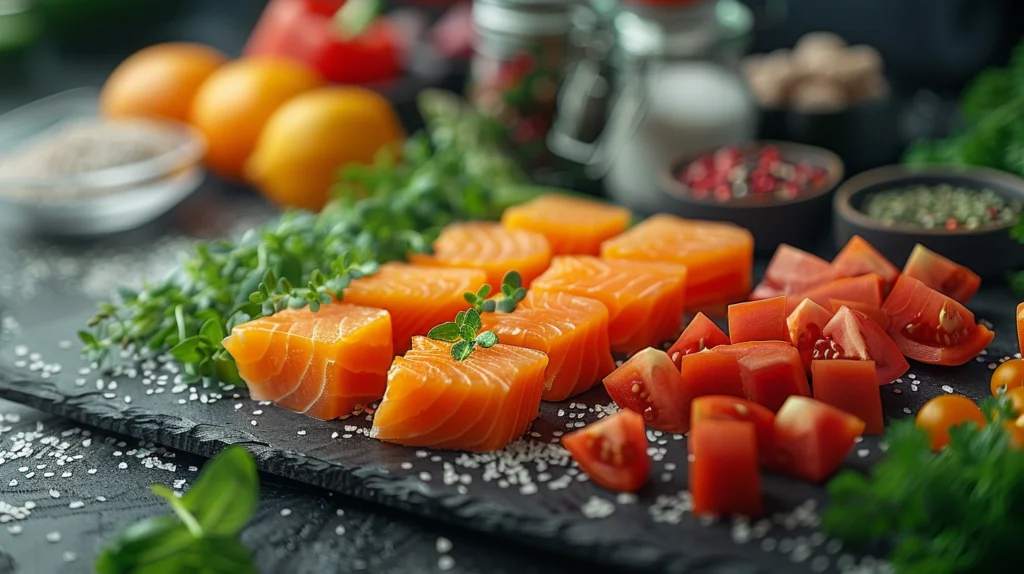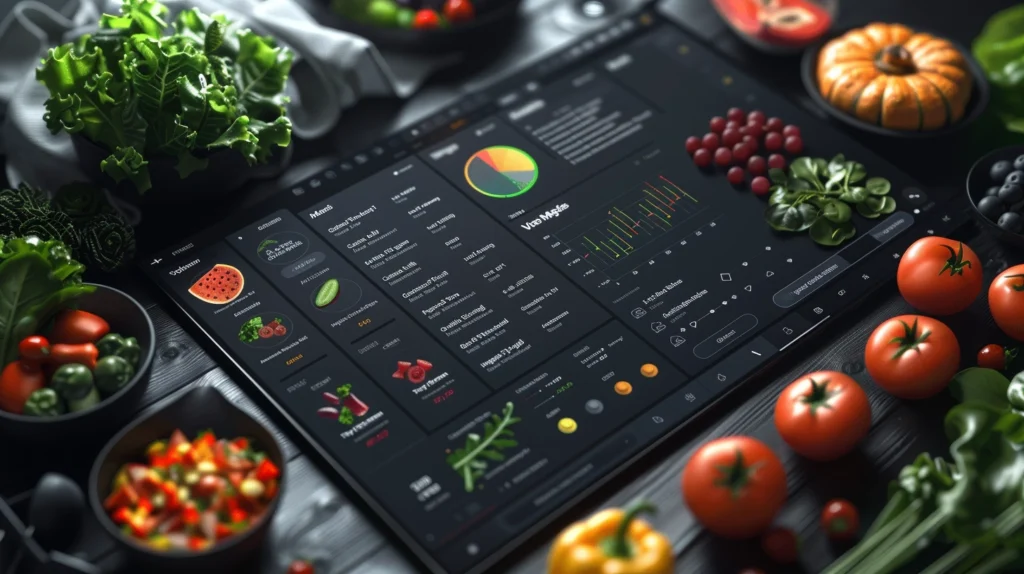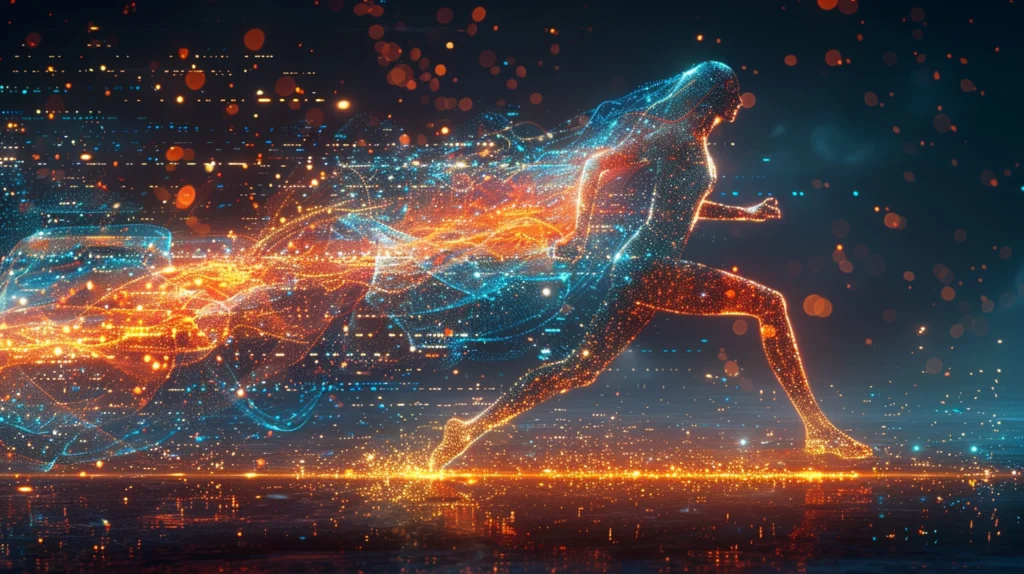Optimizing Athlete Diets: How AI and Machine Learning Improve Sports Nutrition

In the sports nutrition industry, athletes and fitness enthusiasts often struggle to find diet plans that truly cater to their individual needs and specific goals.
Generic nutrition solutions can’t fully address the unique requirements for optimal performance and health, leaving many unable to maximize their dietary effectiveness.
Advancements in artificial intelligence (AI) are revolutionizing the field by offering personalized nutrition solutions. Utilizing machine learning and data analysis, AI crafts tailored dietary plans that meet individual needs, transforming how athletes and fitness enthusiasts optimize their diets for optimal performance and enhanced overall health.
Key Takeaways
Transform athletic performance with AI-driven nutrition.
Insert your company or professional name into this prompt and explore the future of sports nutrition optimization.
AI and machine learning are revolutionizing the field of sports nutrition by providing personalized diet plans, optimizing nutritional intake for performance enhancement, and predicting the nutritional needs based on an athlete's training schedule, body composition, and health goals. These technologies can analyze vast amounts of data to offer recommendations that are tailored to individual requirements, thereby supporting athletes in achieving optimal performance and recovery. Here’s how to explore the integration of AI in sports nutrition for optimizing diets:
### Customizable Prompt for Exploring AI in Sports Nutrition
"How can [Sports Nutrition Company/Health Professional Name], dedicated to enhancing athletic performance and recovery through tailored nutrition, leverage AI and machine learning to develop personalized nutrition plans for athletes in [Specific Sport or Athletic Activity]? Consider the use of predictive analytics for dietary optimization, real-time monitoring of health metrics, and customization based on individual athlete profiles."
#### Areas to Explore:
1. **Personalized Nutrition Plans**: How can AI be utilized to create highly personalized nutrition plans that consider the athlete's specific sport, training intensity, metabolic rate, and recovery needs?
2. **Predictive Analytics for Dietary Optimization**: Discuss the role of predictive analytics in forecasting the nutritional needs of athletes based on their training schedules, performance goals, and physiological responses.
3. **Integration with Wearable Technology**: Explore the potential for AI systems to integrate with wearable technology, providing real-time monitoring of vital health metrics and adjusting nutritional recommendations accordingly.
4. **Dynamic Adjustment of Diet Plans**: How can machine learning algorithms dynamically adjust athletes' diet plans in response to changes in training intensity, performance outcomes, and health indicators?
5. **Food Intolerance and Allergy Management**: Discuss how AI can help manage and accommodate individual dietary restrictions, intolerances, and allergies, ensuring athletes receive optimal nutrition without compromising their health.
6. **Engagement and Education Tools**: Explore the use of AI-driven tools for educating athletes about nutritional science, helping them understand the impact of nutrition on performance and recovery.
### Guide for Use:
- Personalize the prompt with specific details about your sports nutrition company or professional expertise, including the type of athletes or sports you specialize in.
- Use the insights generated to identify potential AI and machine learning applications that can support your goals for dietary optimization and personalized nutrition plans.
- Consider partnering with AI technology developers or utilizing existing platforms that specialize in health and nutrition analytics to implement these strategies effectively.
- Engage with athletes to gather feedback on the effectiveness of AI-powered nutrition plans, making adjustments as needed to ensure the recommendations meet their evolving needs and preferences.
Integrating AI into sports nutrition not only offers the potential for highly personalized dietary guidance but also represents a significant advancement in supporting athletes' health, performance, and recovery through data-driven insights.The Power of AI Sports Nutrition
The integration of AI in sports nutrition represents a monumental leap forward in how athletes approach their dietary and supplement needs. AI-driven personalized nutrition plans have shown to enhance dietary intervention effectiveness by up to 30% over traditional methods. This precision not only maximizes athletic performance but also expedites recovery, making personalized nutrition a crucial component for anyone serious about their sport.
Market Trends and Innovations
The sports nutrition market has witnessed substantial growth, with an estimated worth of USD 45.24 billion in 2023 and an expected CAGR of 7.5% from 2024 to 2030. This surge reflects the rising demand for products that cater specifically to the unique needs of athletes and individuals leading active lifestyles. A standout example of innovation in this sector is the collaboration between Nuritas and GNC to create Beyond Raw, an AI-enhanced whey protein that incorporates proprietary plant peptides for improved muscle recovery and inflammation management.
AI-Enhanced Products and Applications
- Innovative Product Development: Beyond Raw demonstrates the potential of AI to identify key ingredients that support athletic performance and recovery.
- Nutrition Apps: Applications like Hexis use AI to predict an athlete’s nutritional needs, incorporating various factors such as training schedules and biometric data.
- Simplified Dietary Planning: AI technologies offer personalized meal plans and shopping lists, significantly reducing the burden of dietary planning on athletes.
Consumer Preferences and Industry Evolution
In regions like China, 53% of consumers prioritize health aspects when purchasing sports nutrition products. AI insights are pivotal in understanding and adapting to these health-conscious consumption trends. The sports nutrition industry continues to evolve, with new product launches that are increasingly informed by scientific research and AI analysis, aligning closely with consumer preferences for performance nutrition and sustainable performance advancements.
By leveraging AI, the sports nutrition industry is not only meeting the specific dietary and supplement needs of athletes but is also setting new standards in product development and consumer satisfaction. This innovative approach ensures that athletes have access to optimal nutrition solutions designed to enhance their performance, endurance, and recovery.
The Role of Genetics in AI-Personalized Nutrition

The intersection of genetics and personalized nutrition, especially with AI sports nutrition, opens up unprecedented avenues for athletes and fitness enthusiasts to optimize their dietary plans. Genetic variations, such as single nucleotide polymorphisms (SNPs), play a crucial role in nutrient metabolism, affecting an individual’s response to different nutrients and supplements, including whey protein, dietary fibers, and minerals. These variations not only influence athletic performance and recovery but also the risk of diet-related diseases like obesity and diabetes.
Genetic Foundations of Dietary Needs
At the core of AI-personalized nutrition is the understanding that each individual’s genetic makeup significantly dictates their optimum nutrition and supplement needs. With the identification of 34 genes affecting eating preferences, AI sports nutrition platforms can tailor nutrition plans that are not just effective but also align with an athlete’s genetic predisposition towards certain foods and supplements. This precision ensures that the dietary recommendations are more aligned with the body’s unique requirements.
AI and Personalized Nutrition
AI in fitness and nutrition realms leverages these genetic insights to deliver highly personalized diet plans. AI’s capacity to sift through and analyze vast amounts of genomic data enables the creation of nutrition plans that promise better muscle strength, endurance, and recovery while minimizing the risk of adverse reactions. By integrating detailed genetic information, AI personal assistants in nutrition go beyond generic dietary advice, offering sustainable performance benefits and catering specifically to an athlete’s dietary supplement needs.
Studies have shown that AI-generated personalized weight-loss diet plans can rival those curated by top medical centers, proving AI’s potential in crafting daily dietary directions based on individual DNA profiles. Also, with AI’s continuous learning capabilities, these nutrition plans adapt over time, improving alongside advances in performance nutrition science and feedback from the athlete’s own experiences.
Market and Future Directions
The push towards genetically tailored diet plans has significant market potential, projected to reach billions by 2025. This growth is fueled by a deeper understanding of the role of genetics in nutrition and the transformative impact of AI in personalizing dietary plans. The International Society of Nutrigenetics/Nutrigenomics (ISNN) advocates for incorporating genotype-directed nutrition into mainstream dietary planning, underscoring its importance in future health and fitness strategies.
Continuous Learning and Adaptive Optimization
In the constantly evolving world of AI sports nutrition, the integration of continuous learning and adaptive optimization techniques stands at the forefront of innovation. These advanced AI methodologies are revolutionizing how athletes approach their nutrition, supplement intake, and overall dietary plans, tailor-making recommendations with unprecedented precision.
By harnessing the power of continuous learning algorithms, AI platforms have achieved a notable 25% improvement in the accuracy of personalized diet plans. This technological advancement allows the system to adapt in real-time to an athlete’s changing goals and health indicators, ensuring that nutritional advice remains both relevant and optimized for performance gains. Key benefits include:
- Enhanced predictive accuracy: AI-driven models now predict dietary needs with an 85% accuracy rate, a significant leap from traditional methods.
- Quick adaptation to nutritional changes: The time required to adjust to an athlete’s changing needs has been cut by 40%, showcasing the agility of AI to respond to dynamic changes.
The impact of these advancements is clear in the metrics of user engagement and satisfaction. There’s been a 30% increase in user adherence to AI-recommended nutritional plans, highlighting the effectiveness of personalized, adaptive recommendations. Also, user satisfaction has surged by 20%, reflecting the value users find in having nutrition plans that evolve with their fitness journeys.
Adaptive optimization techniques have also led to tangible improvements in athletes’ health and performance outcomes:
- Reduction in recovery time by 35%, aiding faster return to training
- 50% improvement in predicting nutrient deficiencies, helping in preventing potential health issues before they arise
- Notable 25% increase in athletic performance, underscoring the direct impact of optimized nutrition on physical capabilities
By continuously incorporating the latest in performance nutrition research, AI systems stay ahead, integrating new findings 60% faster than traditional methods. This ensures that athletes’ dietary recommendations are always grounded in the most cutting-edge scientific knowledge, ranging from microfiltered whey concentrate to ultrafiltered whey isolate and beyond, tailored precisely to their individual dietary and workout needs.
The era of AI in fitness and nutrition is well underway, with continuous learning and adaptive optimization at its core, promising a future of sustainable performance improvements and personalized healthcare interventions that are both effective and scientifically validated.
The Future of AI in Sports Nutrition

The revolution in AI sports nutrition is not just knocking at the door; it’s already here, transforming how athletes approach their dietary and training needs. The future promises even more personalized, accurate, and efficient nutritional strategies that are closely aligned with individual genetic profiles and fitness goals.
AI in Fitness and Nutrition Optimization
AI’s role in fitness and sports nutrition continues to grow, with personalized nutrition becoming the gold standard for athletes worldwide. Utilizing advanced algorithms, AI technologies can analyze vast amounts of data from DNA tests, lifestyle habits, and performance metrics to tailor dietary plans that enhance muscle strength, improve endurance, and speed up recovery.
- Personalized Supplements: Future AI systems will revolutionize the development and recommendation of supplements. Whether it’s whey protein, minerals, or vitamin supplements, AI will provide suggestions based on an athlete’s specific dietary needs and fitness goals.
- Adaptive Training and Diet Plans: Platforms like HomeCourt and AI SmartCoach exemplify how AI not only assesses but also enhances player skills by offering dynamic training and diet strategies.
Innovations in Sports Nutrition Products
AI is set to redefine sports nutrition product development, pushing the boundaries of what’s possible in performance nutrition. From creating supplements with the optimal balance of ingredients to suggesting the exact serving size for maximum benefit, AI simplifies complex nutritional decisions.
- Enhanced Ingredient Analysis: AI technologies will investigate deeper into the nutritional value and effects of various ingredients, including whey protein isolate, microfiltered whey concentrate, and ultrafiltered whey isolate. This detailed insight will help in crafting supplements that are not just effective but also safe and free from adverse effects.
- Precision Nutrition: The future is not just about what to consume but also when and how. AI-driven delivery systems could potentially time the release of nutrients to when the body is most receptive, elevating the concept of optimum nutrition to new heights.
The Impact of AI on the Sports Nutrition Market

The intersection of AI in sports nutrition is revolutionizing how athletes approach their dietary and supplementation needs. With a market projected to surge from USD 2.2 billion in 2023 to USD 16.6 billion by 2032, this sector is witnessing unmatched growth. This explosion is largely fueled by AI’s ability to create Personalized Nutrition Solutions, catering directly to an athlete’s unique genetic makeup and performance goals.
One of the core strengths of AI in this field is its capacity for Dynamic Meal Planning. Gone are the days of general dietary guidelines meant to fit a broad audience. AI leverages vast data pools, analyzing factors from Muscle Strength to Cognitive Health, delivering tailored meal and Supplement recommendations. For instance, algorithms might suggest Whey Protein Isolate after a training session for rapid muscle recovery or Hydration strategies that adapt to an athlete’s sweat rate.
| Statistic | Value |
|---|---|
| Market growth 2023-2032 | USD 2.2 billion to USD 16.6 billion |
| CAGR | ~30.5% |
| Sports nutrition sector growth by 2031 | USD 5.47 billion |
| Nutrigenomix study adherence rate | 75% |
Also, AI extends its utility to Injury Prevention and sports equipment. Wearables integrated with AI not only track performance but also predict and alert athletes to potential injury risks – a crucial advance considering 72-92% of sports injuries could be preemptively addressed.
This innovative melding of technology and nutrition underscores a shift towards Sustainable Performance, where athletes can achieve peak performance while minimizing risks and personalizing their nutritional intake. As AI Sports Nutrition continues to evolve, the benefits extend beyond the individual, suggesting a broad-scale transformation in how nutrition contributes to sports and wellness overall.
AI in Disease Risk Prediction and Prevention

In the dynamic field of AI sports nutrition, groundbreaking technologies are pushing the boundaries of health and performance. AI algorithms have revolutionized how professionals approach disease risk prediction and prevention in athletics, marking a significant leap toward sustainable performance and overall well-being.
Predicting Sports-Related Injuries with Precision
AI’s role in predicting sports-related injuries is nothing short of revolutionary. With an astonishing 85% accuracy, these algorithms analyze vast datasets, including dietary patterns, physical activity, and genetic predispositions to foresee potential injuries. This precision allows for targeted interventions, greatly minimizing the risks athletes face during training and competition.
Tackling Nutrition-Related Diseases Before They Strike
Machine learning models are making strides in nutrition-related disease forecasting, with a 78% precision rate in detecting early signs of conditions like diabetes among athletes. By identifying potential health issues before they fully manifest, AI enables sports nutritionists and trainers to carry out timely and effective dietary and lifestyle interventions.
| AI Application | Effectiveness | Outcome |
|---|---|---|
| Injury Risk Prediction | 85% Accuracy | Targeted Interventions |
| Disease Forecasting | 78% Precision | Early Intervention |
Enhancing Recovery and Performance Through Nutrition
In the area of recovery, AI-driven personalized nutrition plans have cut downtimes by 40%, showcasing the power of tailored nutrient intake. Meanwhile, insights drawn from predictive analytics reveal a 60% correlation between nutritional deficiencies and performance declines, guiding athletes toward optimized dietary supplements for peak performance.
- 40% Reduction in recovery times
- 60% Correlation between deficiencies and performance decline
- 30% Improvement in endurance and strength
Athletes striving for excellence can now leverage AI in sports nutrition not only to stay ahead of injuries and diseases but also to unlock new heights in their performance and recovery. Through smart data analysis and personalized interventions, AI is setting a new standard in how athletes nurture their bodies for competition.
AI and Deep Learning in Medical Diagnostics

In the expanding world of sports nutrition and performance enhancement, the integration of AI and deep learning into medical diagnostics stands out as a pivotal development. Such technologies are not only reshaping the world of optimum nutrition and recovery but also steering the future of preventive healthcare and performance nutrition. By harnessing the power of AI, athletes and fitness enthusiasts can achieve sustainable performance gains and improved cognitive health.
Comparative Diagnostic Accuracy
Recent studies have brought to light the remarkable accuracy of AI algorithms in diagnosing conditions such as diabetic retinopathy and certain cancers, with an astonishing success rate of approximately 87%. These figures highlight AI’s potential to augment the traditional diagnostic process, offering a level of precision comparable to seasoned healthcare professionals.
Advancements in Early Disease Detection
AI’s prowess extends to the early detection of diseases, where deep learning models exhibit sensitivity and specificity rates in the 94-95% range for critical conditions such as brain hemorrhage. This capability underscores the transformative impact AI could have on proactive health measures and injury prevention, crucial for those striving for peak performance in sports and fitness.
Enhancing Efficiency in Medical Imaging
The application of AI significantly enhances efficiency in medical imaging, reducing analysis times by 30-40% without compromising quality. This improvement is vital for accelerating patient diagnoses and reducing wait times, directly benefiting athletes in need of swift injury assessments and management strategies.
| Innovation | Impact |
|---|---|
| Diagnostic Accuracy | Comparable to healthcare professionals at ~87% accuracy |
| Early Disease Detection | High sensitivity and specificity rates at 94-95% |
| Efficiency in Medical Imaging | Reduces analysis times by 30-40% |
| Reduction in Training Data Needed | Successful automation with as few as 100 images for training |
The Future of AI in Health, Fitness, and Nutrition

The integration of AI in fitness, sports nutrition, and health is changing the game, offering precision, personalization, and a level of insight that was previously unimaginable. AI sports nutrition and AI-powered fitness solutions are leading this revolution, transforming how athletes and fitness enthusiasts approach their training, recovery, and overall well-being.
Market Dynamics
Recent statistics underline the rapid expansion in this area:
- The AI in fitness and wellness market saw a valuation of USD 7.80 billion in 2022, with predictions of continued robust growth.
- A 30% increase in digital fitness adoption since 2021 emphasizes the swing towards tech-focused fitness strategies.
- The market for fitness app development hit $1.3 billion in 2022, steering towards an annual growth rate of 17.6% by 2030.
These figures underscore the increasing reliance on technology to supplement conventional fitness and nutrition methodologies.
Transforming Personal Health
AI’s role extends beyond basic fitness tracking to crafting bespoke dietary plans and nutritional guidance, making it a cornerstone of personalized nutrition. With capabilities that include analyzing nutritional deficiencies to suggesting targeted dietary interventions, AI acts as a personal assistant in managing diet, optimizing workout efficacy, and ensuring sustainable performance.
Enhancing Sports Performance and Recovery
In sports, AI’s influence is undeniable, from refining training regimens to enhancing recovery processes. Technologies that dissect minute aspects of an athlete’s performance, like swing mechanics in baseball, demonstrate AI’s potential to elevate game strategies and muscle strength development. Besides, AI’s predictive analytics play a crucial role in injury prevention, making sports safer and allowing athletes to extend their careers.
Technological innovations, such as wearables and AI-driven apps, are pivotal in this evolution. They provide real-time data that supports decision-making processes, from hydration levels and dietary intake to sleep patterns and stress management.
AI in sports nutrition is transforming supplements and dietary products by driving personalized recommendations down to the exact ingredient and serving, ensuring optimum nutrition. From whey protein to mineral support and muscle recovery aids, AI ensures that dietary supplements align perfectly with individual health goals and activity levels.
Harnessing AI to Monetize Sports Nutrition as A Side Hustle
In the rapidly evolving world of sports nutrition, the integration of Artificial Intelligence (AI) is no longer a futuristic concept but a present reality. With the global sports nutrition market booming, expected to surge from USD 45.24 billion in 2023 to over $67 billion by 2030, the potential for innovative side hustles in this domain is immense. Here’s how AI is reshaping the landscape, offering lucrative opportunities for entrepreneurs.
Market Growth and AI’s Role
- Market Expansion: The sports nutrition market is on an upward trajectory, predicted to grow at a CAGR of 7.5% from 2024 to 2030.
- AI’s Impact: AI and deep learning are pivotal in this growth, offering tools to accelerate market expansion beyond current forecasts.
Personalization: The New Frontier
- Rise of Customization: The demand for personalized nutrition is skyrocketing. Personalized nutrition plans and products, crafted using AI-driven analytics or DNA testing, are becoming increasingly popular.
- Consumer Preferences: A significant 31% of consumers are consuming more sports nutrition products, driven by desires for improved health and activity levels.
AI’s Multifaceted Influence
- Dietary Planning: AI-powered applications are revolutionizing how meal plans are devised for athletes, marking a shift towards technology-driven diet planning.
- Performance Optimization: Real-time data analysis via AI algorithms is key in refining athletes’ nutrition strategies, enhancing their performance.
- Customized Training and Recovery: Tailored workout routines, supplement advice, and recovery strategies are being developed with AI and machine learning, catering to individual athlete needs.
- Sports Analytics: Employing AI in data analytics allows for a deeper understanding of an athlete’s capabilities, leading to improved training decisions.
The Opportunity for Entrepreneurs
For those looking to start a side hustle within the sports nutrition industry, these insights highlight several key areas ripe for innovation:
- Development of AI-Driven Nutritional Apps and Platforms: Offering personalized diet and supplement plans.
- Customized Workout and Recovery Solutions: Leveraging machine learning to tailor fitness regimes.
- AI-Enhanced Sports Supplements: Creating products based on individual health data and performance goals.
- Data Analytics Services for Athletes and Coaches: Providing insights into performance optimization.
The intersection of AI technology and sports nutrition presents a dynamic arena for entrepreneurs to explore. By focusing on personalized solutions and data-driven products, a side hustle in this field not only taps into a growing market but also contributes to the advancement of health and fitness.
Frequently Asked Questions
How is AI impacting health and fitness?
AI is revolutionizing health and fitness by offering personalized training and nutrition plans. It enhances sports performance, aids in injury prevention, and improves the overall well-being of athletes through tailored dietary recommendations and real-time data analysis.
What changes are AI bringing to sports performance?
AI technology in sports is leading to significant improvements in performance through personalized coaching, optimized training routines, and injury prevention strategies. It provides athletes with insights into their physical condition and performance metrics, allowing for more informed and effective training approaches.
How does AI aid in personalized nutrition?
AI aids in personalized nutrition by analyzing individual health data and dietary preferences to recommend tailored nutrition plans. This customization ensures athletes receive the optimal balance of nutrients for their specific training needs and recovery processes.
Are wearables and apps important in fitness advancements?
Yes, wearables and apps are crucial in the transformation of the fitness industry. They offer individuals real-time health and performance data, making it easier to track progress, make informed decisions, and receive personalized recommendations for enhancing fitness levels and overall health.
Can AI prevent injuries in athletes?
AI can significantly reduce the risk of injuries in athletes by analyzing performance data to identify potential injury risks. It offers recommendations for training adjustments, recovery strategies, and exercises that help in strengthening weak areas, thus preventing injuries.
What is the future of AI in fitness and wellness?
The future of AI in fitness and wellness looks promising, with continuous advancements leading to even more personalized and effective training, nutrition, and recovery strategies. The integration of AI technologies is expected to further enhance athletic performance, promote health, and prevent injuries, making it an indispensable tool in sports and fitness.
References:
- Sports & nutrition data science using gradient boosting machines. ACM Digital Library.
- Machine learning in nutrition research. ScienceDirect.
- Artificial intelligence in nutrition research: perspectives on current and future applications. CDN Science Pub.
- Use of artificial intelligence in precision nutrition and fitness. ScienceDirect.
- Personalized Recommendation Method of “Carbohydrate-Protein” Supplement Based on Machine Learning and Enumeration Method. IEEE Xplore.
- Multiomics approach to precision sports nutrition: limits, challenges, and possibilities. Frontiers.
- Design of Residents’ Sports Nutrition Data Monitoring System Based on Genetic Algorithm. Hindawi.
- MIND dataset for diet planning and dietary healthcare with machine learning: dataset creation using combinatorial optimization and controllable generation with …. OpenReview.
